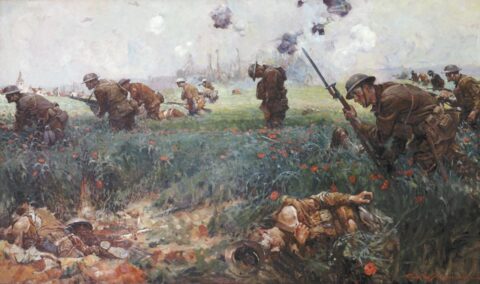Severian wonders how the deep state’s public muppets will manage now that former President Donald Trump has been brought to court:
Let us ask ourselves, then, what The Left‘s “exit strategy” could possibly be, for any of their outstandingly Juggalicious projects. They of course don’t actually have one — “grokking the skull-fuckingly obvious consequences of their actions” not being the Left’s long suit — but if they did, what would it be?
And I admit, I’m buffaloed. We’ve already talked about the Ukraine thing, so let’s contemplate how the BOM’s “indictment” ends.
One wonders what happens if they throw the book at him. What’s the max sentence? It’s important. Does he face actual jail time? How much? I’m assuming for the purposes of this exercise that the jury will not only convict him, but give him the max, because c’mon man, this is AINO — we live in a Prerogative State now; jaywalking is a federal pound me in the ass prison offense if you can be proven to have voted the wrong way. What can they give him?
[…]
Throw BOM in the slammer, and there you have it. Not even Toby fucking Keith could fail to conclude that we now live in a police state. They’re screwed …
But they’re equally screwed if he gets off, because then their guys will go nuts, and forget passive resistance, the Left gets to riot. And riot they shall, because they’ve got a real taste for it now. Even if everything breaks perfectly for the Juggs for the next few years, Antifa etc. will still be rioting whenever they feel aggrieved — and when do they not? — simply because they like it. And they never face any consequences, so why not flip cars and break shit and light buildings on fire every time Starbucks raises the price of a frappucino?
Same deal if the BOM gets a slap on the wrist. I think that was the original plan, insofar as they’re capable of planning — indict him, slap him on the wrist, and turn him loose. They didn’t think past “getting him off the 2024 ballot”. If they even thought that far … which I doubt, but let’s give them the benefit of the doubt. Even though they must know that 2024 will be Fortified for Democracy™, the BOM’s very existence terrifies them, because he shows that there’s a possible alternative. We see him for the ridiculous CivNat pussy he is, and we know full well we’re not voting ourselves out of what’s coming. But they see him as a real threat.
A Serious version of the BOM would be a very big deal indeed. They can’t allow that to happen. And so long as the BOM stays on this side of the grass, that seems to them to be a live possibility.
So what can they do? Seriously asking. How the hell do they get themselves out of this? If you were the Machiavelli behind Les Juggs, what would you tell them to do? I’m a Historian, so I can envision a lot more “worst case scenario” than most people, and all I can think of is “Roll the fucking tanks”. I don’t think even their total lock on the Media will work this time — you can instruct them to never speak of it again, but they don’t see themselves as your loyal stenographers anymore; they consider themselves news makers, not just news reporters.
Maybe … just maybe … you could sacrifice Alvin Bragg. Throw the case out for the obviously political hitjob it is, then keester Bragg with everything in the arsenal. Disbar him; haul him up on “prosecutorial misconduct” charges, and the throw the book at him. If I were trying to get Les Juggs out of it with the minimum of violence while maintaining the barest fig leaf of legitimacy for The System, that’s what I’d advise.
But they’re simply not psychologically capable of doing that. Admitting it’s a hitjob means admitting that the BOM was right about something, and that cannot stand.







